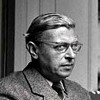“ when, being an infamous coward, he is firm in the necessities of poverty; when he shrinks at the sight of a barber’s razor, and rushes fearless upon the swords of the enemy, the action is commendable, not the man. ”
Michel de Montaigne, The Essays of Michel de Montaigne (1580). copy citation
| Author | Michel de Montaigne |
|---|---|
| Source | The Essays of Michel de Montaigne |
| Topic | poverty action |
| Date | 1580 |
| Language | English |
| Reference | |
| Note | Translated by Charles Cotton |
| Weblink | http://www.gutenberg.org/files/3600/3600-h/3600-h.htm |
Context
“he would bear a sickness in his bed as bravely as a wound in the field, and no more fear death in his own house than at an assault. We should not then see the same man charge into a breach with a brave assurance, and afterwards torment himself like a woman for the loss of a trial at law or the death of a child; when, being an infamous coward, he is firm in the necessities of poverty; when he shrinks at the sight of a barber’s razor, and rushes fearless upon the swords of the enemy, the action is commendable, not the man.
Many of the Greeks, says Cicero,— [Cicero, Tusc. Quaes., ii. 27.] — cannot endure the sight of an enemy, and yet are courageous in sickness; the Cimbrians and Celtiberians quite contrary;
“Nihil enim potest esse aequabile, quod non a certa ratione proficiscatur.””
source



